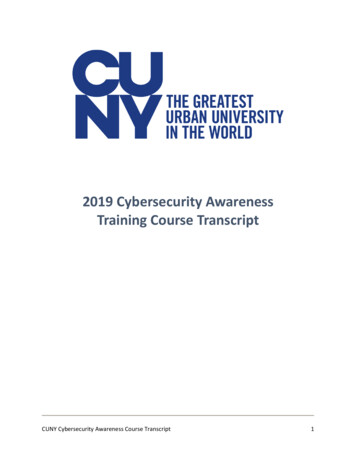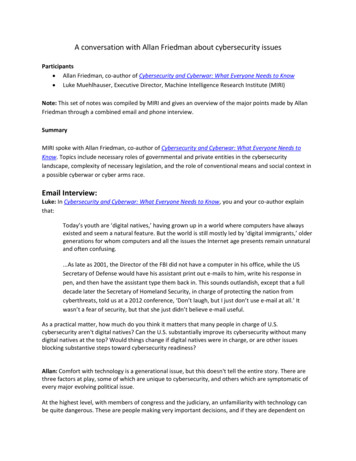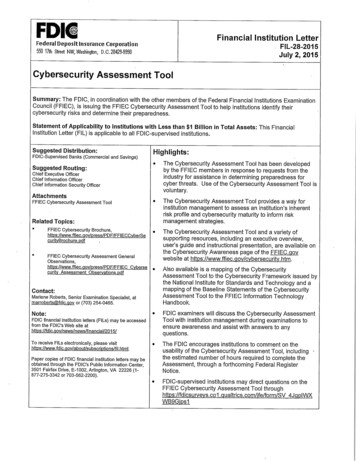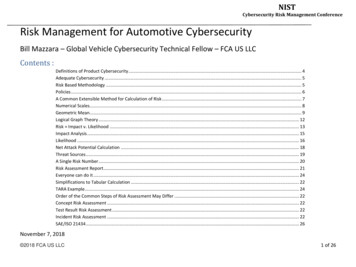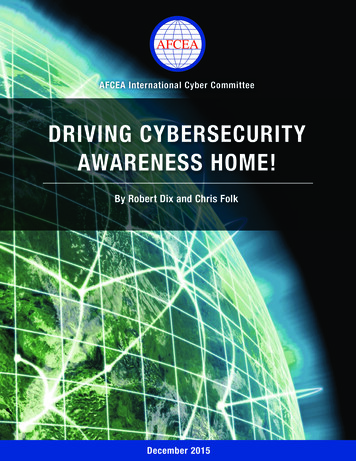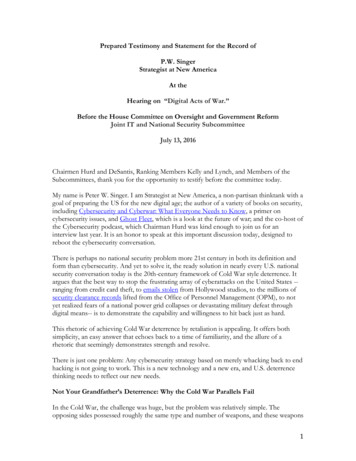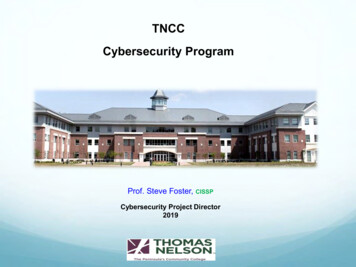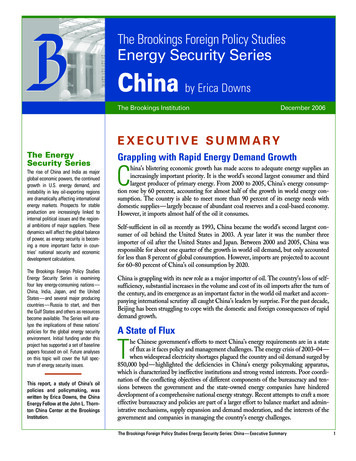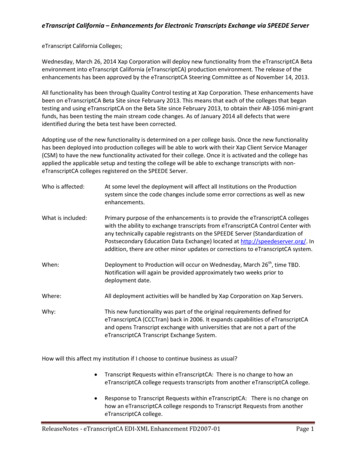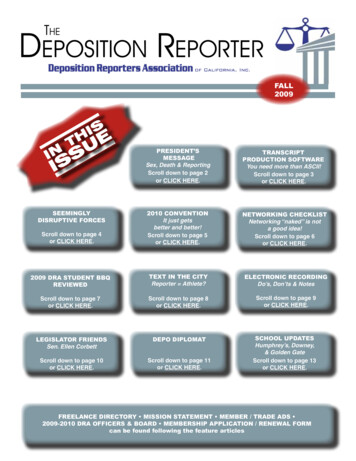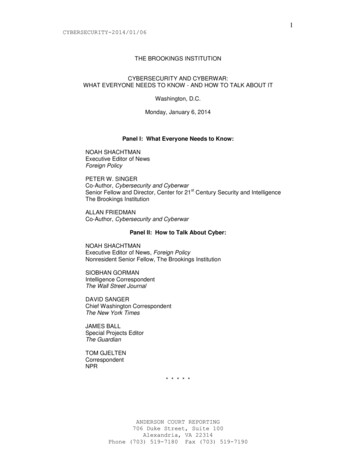
Transcription
1CYBERSECURITY-2014/01/06THE BROOKINGS INSTITUTIONCYBERSECURITY AND CYBERWAR:WHAT EVERYONE NEEDS TO KNOW - AND HOW TO TALK ABOUT ITWashington, D.C.Monday, January 6, 2014Panel I: What Everyone Needs to Know:NOAH SHACHTMANExecutive Editor of NewsForeign PolicyPETER W. SINGERCo-Author, Cybersecurity and CyberwarstSenior Fellow and Director, Center for 21 Century Security and IntelligenceThe Brookings InstitutionALLAN FRIEDMANCo-Author, Cybersecurity and CyberwarPanel II: How to Talk About Cyber:NOAH SHACHTMANExecutive Editor of News, Foreign PolicyNonresident Senior Fellow, The Brookings InstitutionSIOBHAN GORMANIntelligence CorrespondentThe Wall Street JournalDAVID SANGERChief Washington CorrespondentThe New York TimesJAMES BALLSpecial Projects EditorThe GuardianTOM GJELTENCorrespondentNPR* * * * *ANDERSON COURT REPORTING706 Duke Street, Suite 100Alexandria, VA 22314Phone (703) 519-7180 Fax (703) 519-7190
2CYBERSECURITY-2014/01/06PROCEEDINGSMR. SHACHTMAN: Hi, everybody. I’m Noah Shachtman, I’m a nonresident fellow here at Brookings and I work for a magazine down the street calledForeign Policy and I’m really honored and I’m really excited to celebrate the launch ofPete Singer and Allan Friedman’s really interesting book, which I have right here in myhand, Cybersecurity and Cyberwar: What Everyone Needs to Know, which has alreadybeen endorsed by everybody from the former commander of NATO to the head ofGoogle to the producer of 24 and Homeland.And we’re going to talk today about some of the big issues incybersecurity, sort of what are the policy implications of them, what are the policyresponses, and what can we do as ordinary folks.stPeter, as I’m sure you all know, is director of the Center for 21 CenturySecurity and Intelligence here at Brookings. Allan is now a visiting scholar at theCybersecurity Policy Research Institute at George Washington and was here atBrookings for three years.And it’s interesting to me that, you know, just to kick things off, that thisbook is coming out now. I mean, we’ve sort of had, it seems, like a stream ofcybersecurity stories, mishaps, events, in the last, you know, five years, and so I guessI’m curious why you guys decided now was the time to sort of in a way kind of go back tobasics and set the table and kind of lay out a primer for folks about what they needed toknow on the topic.MR. SINGER: I’ll weigh in on that and first want to thank you and thankall of you for coming out. Really appreciate it. It’s an exciting time for us and thatactually links to your question because a book is a journey, you know, it’s coming outright now, but it’s showing the journey of almost two years, and the idea behind it, andwhy we think it’s particularly relevant right now, is that I would argue there’s no issuethat’s become more important, that’s less understood, than cybersecurity.ANDERSON COURT REPORTING706 Duke Street, Suite 100Alexandria, VA 22314Phone (703) 519-7180 Fax (703) 519-7190
3CYBERSECURITY-2014/01/06And when I say “more important”, more important in terms of its policyimplications, whether you work on classic military issues, national security issues, tolegislative questions, to the business side, to your own role as a netizen, but also at acitizen or a parent. Another way of putting it is that the issues that are at play here are asweighty as the future of world politics, to as important as your own personal privacy oryour kids on what they’re doing on Snap Chat or the like, and yet there’s a gap there andthe gap we can see it in lots of different ways. We can see it in the former director of theCIA described it as he’s never dealt with an issue where there was less knowledgeamong the people around the table making decisions to 70 percent of businessexecutives have made a cybersecurity decision for their company, not 70 percent ofCTOs or CSOs but of execs in general, and yet no major MBA program teachers on it asa regular management issue to, again, you know, our own personal -- the way we handleour self online in terms of, you know -- our favorite story is probably the most popularpassword is still password, followed by 1-2-3-4-5-6, which is, you know, the joke was thatthat’s what I use on my luggage.But also, again, to how we handle a citizen, all these different issues thatare popping up right now, whether it’s the NSA or the like, and so the goal behind thebook was to -- as you put it -- get to basics. I would argue, though, it’s not back to basicsbecause we never got to basics in the first part, and so it’s to give you an easy to readprimer of all the key questions, everything from how does this all work to why does itmatter to, finally, what can we do about it, and to do it, and again, emphasizing whateveryone needs to know, because as long as we have the Internet and we’re using it,we’ll have issues of cybersecurity and cyber war.MR. SHACHTMAN: Allan, it seems to me 2013 was kind of the -- wasthe year of the leak, right, I mean, in terms of cybersecurity. I don’t know if you guysheard, there was an NSA contractor who got his hands on some documents.What do you see 2014 heading? What’s the text landscape like? WhatANDERSON COURT REPORTING706 Duke Street, Suite 100Alexandria, VA 22314Phone (703) 519-7180 Fax (703) 519-7190
4CYBERSECURITY-2014/01/06are the big issues we’re going to face? What’s 2014 going to be the year of?MR. FRIEDMAN: You know, the nice thing about predicting the future isyou can say it’s going to be like the past, but more so.MR. SHACHTMAN: Yeah.MR. FRIEDMAN: So, looking back, one of the interesting things about2013 was I think it was the first year that no major person in the policy world gave aspeech that amounted to “the problem with the Internet was that it was built withoutsecurity in mind; the solution is therefore to build a whole new Internet, but this time we’llmake it secure”.MR. SHACHTMAN: Right.MR. FRIEDMAN: So, we’re starting to move in this direction, butultimately we want to move from an area where cybersecurity is something that is seenas unique and separate and cut new out of whole cloth into an issue that is nowintegrated into everything, where the manager can’t just say, I’m going to call my cyberguy, you’re going to have to have cyber people involved.So, one thing I think we can expect to see is boards of directors aregoing to start demanding briefings. They’re going to say, listen, we hear about this stuff,how are we covered? At the technical level, you’re going to see a lot more creativeattacks where we’re going to move from just taking advantage of the human error andfinding new challenges.One of the largest questions is -- are always at the sort of intersection ofthe technical and the economic and political, so who bears the responsibility for securityyour cell phone? Is it the manufacturer of the phone? Is it the manufacturer of theoperating system? Or is it your cell phone company with whom you have a directrelationship?I think in 2014 those questions are going to come to a head and we’regoing to see a lot of lawsuits and we’re going to see a number of people trying to proposeANDERSON COURT REPORTING706 Duke Street, Suite 100Alexandria, VA 22314Phone (703) 519-7180 Fax (703) 519-7190
5CYBERSECURITY-2014/01/06new technical fixes. The challenge is going to be to make sure that we don’t fall forsnake oil and actually work towards a sort of coordinated approach.MR. SHACHTMAN: And I’m going to ask a couple more questions ofthese guys because there’s some things I’m dying to ask them, and then we’re going toopen it up to the audience, so get your questions ready.You know, both of us have sort of worked around Pentagon types for awhile and it always seems like the answer to any cybersecurity question is, like, moreoffense, like, you know, and you know, if we’re being hacked, the answer is to hack themback 100 times more.First of all, do you see that trend continuing in the government thateverything’s got to be about offense? And secondly, does that trend so far make anysense?MR. SINGER: It’s a good question and it’s a big question ofconsequence when we think about not just what we’re spending on, but the potential ofthis to spiral out into directions that we don’t want it to or we lose control over.And, you know, so this notion of cyber offense is very appealing, it’sappealing in terms of just how it sounds. If somebody attacks me, I’ll attack them first; orthe best way to defend yourself is a good offense. We can see it and its implications inthe assumptions that we’re starting to bake into our military doctrine that’s out there. Forexample, there was a Pentagon statement that says that in cyber space that offense willbe dominant “for the foreseeable future”, that’s the Pentagon’s assessment.There’s a series of issues with that, the first is actually cyber offense, atrue cyber offense, an effective one, a Stuxnet style -- you know, in our next panel we’regoing to hear from some experts on it, but to do something like that is quite difficult, it’snot as we’ve seen senior Pentagon officials describe where they -- you know, they’rephrasing it is that a couple of teenagers -- and this is their quote -- sipping Red Bull,wearing flip flops in their parent’s basement could pull off a weapons of mass destructionANDERSON COURT REPORTING706 Duke Street, Suite 100Alexandria, VA 22314Phone (703) 519-7180 Fax (703) 519-7190
6CYBERSECURITY-2014/01/06style event. No, they couldn’t.There’s very real -- and, you know, we wrote a book on it -- very realcyber threats out there, but to do some of the more effective stuff, it’s not that easy. Also,the defender actually has a series of steps that they can take to make cyber offensedifficult. But what I’m getting at is that it’s not this easy offense way.The second is when you start to connect both the technical side to themilitary side to the policy side to the history side, you see some lessons crossing backand forth. So, for example, every time in military history where someone has said thatthe military offense will be dominant, actually history had a great way of teaching themthat it played out the opposite. Prior to World War I would be a really good example ofthis.The next problem is, where do these assumptions sometimes take you?And we’ve seen this in what we’re spending on right now, the U.S. military is spending -it depends on which study, but roughly 2.5 to 4 times as much on cyber offense researchas they are on cyber defense research, which one has certain implications for a kind ofinstability, but also if you go back and, you know, connect to security studies, it’s a lot likethinking that the best way to protect your house, your glass house, from a gang of rovingteens is to buy a stone sharpening kit. And that’s, you know, the implication here. Weneed to come to a balance not only in how Allan was talking about -- saying of how wetalk about, how we assess these threats, but also a balance in what we’re spending onand how we approach it.MR. FRIEDMAN: And just from a political perspective, one of the thingsthat I think is a novel aspect of this from an international conflict perspective is when wetalk about attacking their systems and they talk about attacking our systems, they are thesame systems. We are using the same platforms, and so often we are going to be facedwith a decision of do we exploit the other guy or do we work towards defendingourselves. And when you start to realize, well, actually, there’s not just us versus them,ANDERSON COURT REPORTING706 Duke Street, Suite 100Alexandria, VA 22314Phone (703) 519-7180 Fax (703) 519-7190
7CYBERSECURITY-2014/01/06it’s us defined many different ways and a whole lot of different thems. You need to havesome kind of equilibrium where we tip towards the defense, where we emphasize the factthat we’re all better off if we move towards a more secure posture.MR. SHACHTMAN: Yeah, and we’ve seen that in the NSA story, right,which is I think one of the reasons why a lot of people are outraged is that they’re not justundermining, you know, accessing the email accounts of a couple of terror suspects, butthey’re sort of undermining some fundamental security protocols that work for all of us.MR. FRIEDMAN: I think that’s a key point. So -- and we don’t want toover state it, right, so there was a headline in the Washington Post this weekend thatsaid, you know, the NSA is trying to break all of our codes. Well, that’s kind of their job,right, their job is to be a foreign intelligence organization.The challenge is, how are we going to scope it and how well is thisplaying with other national priorities? And we want to make sure that other national goalsfor diplomacy, for commerce, for trade are balanced in the government’s process, and Ithink that’s why a lot of Americans were very upset and why people around the worldsaid, well, you know, what does this mean for us? If we have the power to do this,shouldn’t we be doing this as well? That doesn’t lead to a very stable world.MR. SHACHTMAN: Peter, how do you think -- well, I’ll just speakpersonally -- is that I think pre-Snowden in -- you know, I had some -- I was doing somepolicy work here and frankly it relied on trust in the government that I feel like I can’t takeanymore after the Snowden leaks. Maybe you can talk to me a little bit about how thoseleaks are kind of effecting policy prescriptions across the board.MR. SINGER: Well, I think the challenge of what was disclosed is themassive scale of it brought together a variety of things, and so when we’re talking aboutthe leaks, I categorize them into sort of three types of activity, the first was smart,sensible espionage against American enemies. There’s a series of activities that weredisclosed that way. The second category I would put in terms of “questionable” -- legallyANDERSON COURT REPORTING706 Duke Street, Suite 100Alexandria, VA 22314Phone (703) 519-7180 Fax (703) 519-7190
8CYBERSECURITY-2014/01/06questionable, politically questionable, basically efforts that involved U.S. citizens throughsome way, be it by a fuzzy legal definition, a technical back door, using a foreign effort,but basically it’s the category of questionable.And to be blunt and direct, a third category that we could call“unstrategic” or “stupid”, which is collecting intelligence on close American allies. Andthe challenge is that we have these three categories that are out there and so whenpeople talk about this issue and how either upset they are about what the government’sdoing or upset they are with Snowden and should he get clemency or not, they usuallykind of focus in on one of those categories.And in turn it’s also effected the way we talk about it and we’ve defendedthese programs in public where much of what matters in the U.S. political discourse iscategory two, the legal questionable stuff, but saying we’re doing that to prevent another9/11 doesn’t make Angela Merkel and the Germans feel better about it because they’re incategory three.And the real effect of this, I think, is not just in terms of how it’s changedthe political discourse here, but the long-term impact of it is probably most going to befelt, I would argue, in two ways: one, on American business, particularly technologycompanies, which at least according to a report from Forrester, will lose as much as 180billion worth of revenue because of disclosures around these activities. That’s whythey’re so peeved.The second is -- and it goes to one of these 2014 questions, is theongoing debate over the future of the Internet itself and its governance, which, you know,in the book we talk about these issues and looking at the ITU -- well, these questionsaround Internet freedom, and frankly, kind of the Internet freedom agenda that the StateDepartment has been pushing, kind of feels almost dead right now. We’ve sort of lost ourswagger.And in the year ahead, there’s going to be some big decisions to makeANDERSON COURT REPORTING706 Duke Street, Suite 100Alexandria, VA 22314Phone (703) 519-7180 Fax (703) 519-7190
9CYBERSECURITY-2014/01/06and my worry is that it’s a combination of us losing our swagger on Internet freedomissues combined with we may have lost certain key swing states that were with uspreviously and so my fear is that if we don’t watch out in the year ahead, the Internet thatall of us have kind of grown to know and love, will not be the ones that our kids inherit.MR. SHACHTMAN: And that’s because of why? Explain that.MR. SINGER: It’s the idea that there’s very different visions about theInternet and how it should be governed, so to speak, and what should be the role ofstates versus the kind of multi-actor layer of responsibility, kind of weirdly but wonderfullyinformal setup that we have right now that’s worked so well, and we’re particularly seeingthis being pushed by authoritarian states. So, another way of putting it is, if you like theway that Russia blacklisted 82,000 websites -- when you try and -- you enter an addressand it doesn’t go to where you want, that very much could be the future if we don’t watchout.That’s different than the NSA worry that you talked about, which is themonitoring side. It’s two very kind of different state problems, but in the politics of it,they’ve gotten wrapped together.MR. FRIEDMAN: And that’s exactly right, they’ve been tied together, soyou have sort of genuine concern about the process that Peter mentioned, that sort ofvery ad hoc, which, I think, to be fair, does seem to hue closely to American interests.We sort of set up this organization, ICANN, and it works well, although if you look at theorganizational structure on paper from a political perspective you say, well, that’s not fair,and let’s move to a more representative style, where every country gets a vote the sameway we have the UN, and the problem is, while that may sound good from anorganizational perspective, it may sound equitable, the consensus seems to be it’s goingto really empower two types of countries, those that want to throw up barriers aroundtheir own national networks for national security reasons, how they define their ownnational security, and countries that want to throw up barriers around it for economicANDERSON COURT REPORTING706 Duke Street, Suite 100Alexandria, VA 22314Phone (703) 519-7180 Fax (703) 519-7190
10CYBERSECURITY-2014/01/06reasons, they want to sort of go back to sort of a local tel-com monopoly style.And this discussion has been sort of really pushed. Last December in2012 it came to a head at a conference in Dubai and the United States and its allies,including Brazil, really held off this. We lost the vote but maintained enough to keep thestatus quo working.And I think if that vote had been taken shortly after the Snowden leaks, Idon’t know how many European allies would have voted with America. So, I think thereal risk of a balkanized Internet, where each country sets up its -- not only just its ownpolicies at the network level, but may actually say, well, listen, we want to make sure thatour technology is in the network and in the computers. We’re going to have national levelpolicies about what kind of crypto-algorithm you can use or how you store your data.That means that everyone who’s making this technology now needs to make a separatechip for each country, and that really is going to hurt the pace of innovation and sort ofchange how the whole cyberspace evolves.MR. SINGER: There’s two more things to add on this. On the domesticside, the sort of link to classic cybersecurity questions, and one is what this has done to,you know, the politics of cybersecurity on Capitol Hill where, you know, look, we haven’thad major cybersecurity legislation pass since 2002. That’s five years before anyoneheard of the iPhone, and because of this and a number of other factors, it’ll be anotheryear at least before we get anything around it because we’ve got this whole other bundleof questions that it just got tied into.The other goes back to your original idea of trust and it’s trust in thecomputer labs and in Silicon Valley, which, you know, I met with a senior leader at aSilicon Valley company who described that they felt they were now in an arms race withtheir own government, with the U.S. government, and the same when it comes to -- youknow, in the book we talk about the importance of finding the “IT” crowd, finding the ITfolks, you know, how do we deal with this human capital problem in cybersecurity? Well,ANDERSON COURT REPORTING706 Duke Street, Suite 100Alexandria, VA 22314Phone (703) 519-7180 Fax (703) 519-7190
11CYBERSECURITY-2014/01/06now some of our government agencies have a major issue here at the same time wherewe need to do a better job of recruiting cyber talent, you know, by one measure, we’reonly getting around 10 percent of the cybersecurity professionals that we need. Well,now it’s going to be even more difficult because of, you know, kind of the tenor aroundthis topic.MR. SHACHTMAN: I’d like to take some questions from the audience.Please phrase them in the form of a question, not a rant, statement, or diatribe. Thatmeans have a question mark at the end or have your voice turn up at least at the end.Start here in the front.MR. PAYNE: I’m Jim Payne with a local contractor/vender, Z&A. I wantto pull the thread on Internet governance. It’s been said that this is as much of a threatas a physical attack on the Internet. So, my question is this, with a question mark, wherein the administration does this issue about Internet governance reside? Who sets thatpolicy? Many people believe that the current ICANN model is too U.S.-centric, so as weneed to evolve, where in the administration -- what organization, agency -- does thisreside?MR. FRIEDMAN: So, like a lot of cyber issues, really covers a lot ofground because the question of Internet governance covers everything from how do weget new domain names or new top level domain names, so we’re moving from a worldwhere everything was either a .com or a .uk, to now anyone can propose their owndomain name -- that’s a trademark issue -- versus the very real questions about how dowe secure that domain name system or how do we allocate the remaining IP addresses,because we’re running out of them. And those cover very different issues.Traditionally, you probably know this, this has been in the Department ofCommerce, which has the contract to negotiate what is called the root, which is the headof the Internet in the domain name system. We talk about this further in the book, there’seven a nice graphic to help you understand it.ANDERSON COURT REPORTING706 Duke Street, Suite 100Alexandria, VA 22314Phone (703) 519-7180 Fax (703) 519-7190
12CYBERSECURITY-2014/01/06What past administrations have been very successful in doing, as well asICANN, is working to make sure this isn’t purely an American question, but at the sametime, the organizational questions of who is going to be in charge globally is a question ofinternational diplomacy where people are lobbying on either side, and that’spredominantly residing in the State Department.MR. SINGER: Let me add, part of the challenge when it comes to thepolicy and the strategy here is two key words: ignorance and imbalance. Ignorance,senior policy makers, the people who truly can make decisions, are not well equipped todeal with these issues, and we’ve got, you know, all of the wonderful, great anecdotes inthe book on this, whether it’s a senior diplomat about to go negotiate with the Chinese onInternet issues who asked us what an ISP was, which is a lot like going off to negotiatewith the Russians in the Cold War and not knowing what an ICBM is.And, you know, look, I’m kind of mocking this but my mom also doesn’tknow what an ISP is and does know what an ICBM is even though, you know, one’sclearly more important -- my mom was a nurse -- to the former Secretary of HomelandSecurity who proudly talked about the fact that she hadn’t used email or social media forover a decade because she didn’t think it was useful.We could go on and on with all these examples. So, you’ve got that levelof kind of ignorance and, you know, it’s just there, but the imbalance side is also there.It’s there, and when we talk about the threats, you noted, you know, this may be as bit apolicy issue as there is, and yet that’s not talked about. When it comes to actual -- thenotion of kind of cyber attacks, as opposed to a structural problem, you know, I wouldargue that the massive campaign of intellectual property theft that’s going on against theU.S. right now, you know, maybe as much as a trillion dollars worth of value lost, thatmatters far more than the narrative that’s out there, a half million times we’ve talkedabout cyber 9/11 or cyber Pearl Harbor or the 31,000 news and magazine articles thathave been written about cyber terrorism, despite the fact that no one has actually beenANDERSON COURT REPORTING706 Duke Street, Suite 100Alexandria, VA 22314Phone (703) 519-7180 Fax (703) 519-7190
13CYBERSECURITY-2014/01/06hurt or killed by cyber terrorism.In the book we joke that it’s a lot like Shark Week, you know, where weobsess about sharks even though you’re 15,000 times more likely to be hurt by yourtoilet. The reality, though, is that a shark has actually hurt someone unlike cyberterrorism.The power grid scenario, squirrels have taken down the power grid moretimes than the zero times that hackers have. So, we’ve got this imbalance in the threat,but also to how we structurally respond to it, whether it’s our spending when it comes tobudgets and kind of the more focus on certain agencies, to the decision making question.In the White House you’ve got 12 people on the National Security staff atthe NSC working cybersecurity questions. You’ve got one on the economic side whoalso, by the way, has responsibility for things like copyrights, et cetera.So, you know, we very much need an approach that’s both informed andbalanced.MR. SHACHTMAN: Next question over here.MR. DOWNEY: Thank you. Richard Downey from Delphi StrategicConsulting. Thank you for a very interesting discussion.You mentioned a little bit about corporations and how they are protectedor how well they are or are not protected and, you know, intuitively you would justassume that large corporations or banks that have lots of resources would do what wasrequired to protect themselves against these kinds of threats, and I’ve seen this -- it’s acybersecurity maturation model that measures how prepared either organizations orcountries are against these kinds of threats. It’s essentially an X-Y axis, zero starting asdefenseless and the curve goes up to resilient, which is if you get an attack you candefend against it easily.And I wonder if you could talk about just in general how along that curve,how prepared you have found corporations and banks to be in preparation against theseANDERSON COURT REPORTING706 Duke Street, Suite 100Alexandria, VA 22314Phone (703) 519-7180 Fax (703) 519-7190
14CYBERSECURITY-2014/01/06kinds of threats.MR. FRIEDMAN: I think the spectrum you’re referring to is the WorldEconomic Forum’s Resilience Spectrum. Is that the one you’re talking about?MR. DOWNEY: (off mic)MR. FRIEDMAN: Okay, sure. So, there are a number of approacheslike that. You know, it’s funny that you used banks and major corporations because Ithink that helps us understand the issue a little bit. Probably the leaders in bothdeveloping defenses and working together to understand how the rifts are interconnectedis the financial sector. Why? Because the financial sector faces very real loss threatsfrom criminals.You know, why do you go after banks? It’s where the money is. And sothe financial sector has learned to work together, develop good defenses, and alsounderstand it from a risk perspective. They don’t have to stop every single attack. Theyhave some models to understand the relationship between how much to invest and whatthey get out.Most companies, in the broader economy, don’t have that. Now, theydon’t have that for a number of reasons, one, we don’t have a good way of understandingwhat our losses, what our risks are. Often when we talk about the theft of competitivedata, we usually think about “the Special Sauce”. When Coca-Cola was hit in 2010, so -an attack that was later attributed to the group that is associated with the Chinesegovernment, did the bad guys go after the secret formula for Coca-Cola? No. No onereally cares about that. What we do know is that less than ten days after the attackhappened, the Chinese government rejected Coca-Cola’s bid to buy the largest soft drinkbottler in China.Now, this was a bid that everyone on Wall Street thought would gothrough, so we have to think about what is at risk from a very broad perspective.The challenge is actually understanding what is at risk and how toANDERSON COURT REPORTING706 Duke Street, Suite 100Alexandria, VA 22314Phone (703) 519-7180 Fax (703) 519-7190
15CYBERSECURITY-2014/01/06defend ourselves and that’s a really big job because it involves having a holistic view ofwhat’s at stake in an organization. That has to come from the board top down, and it alsohas to come from thinking about the risks we face in a way that the managers and theboard will say, well, listen, we have real immediate losses that we can tie to failure to actnow and that may come from the market, it may have to come from a more interventionistgovernment approach.MR. SINGER: One of the main lessons of the book is that, as opposedto how this is often framed and talked about, this cybersecurity, this problem area,whether you’re talking about at the national level all the way down to you as an individual,it’s not about the software, it’s not about the hardware, it’s about the wetware, it’s aboutthe people, it’s about the incentives that drive them, the organizations that they’re in, thelevel of awareness. It’s all about the people at the end of the day.And in turn, in your question, you used a really important word, w
hand, Cybersecurity and Cyberwar: What Everyone Needs to Know, which has already been endorsed by everybody from the former commander of NATO to the head of Google to the producer of 24 and Homeland .
